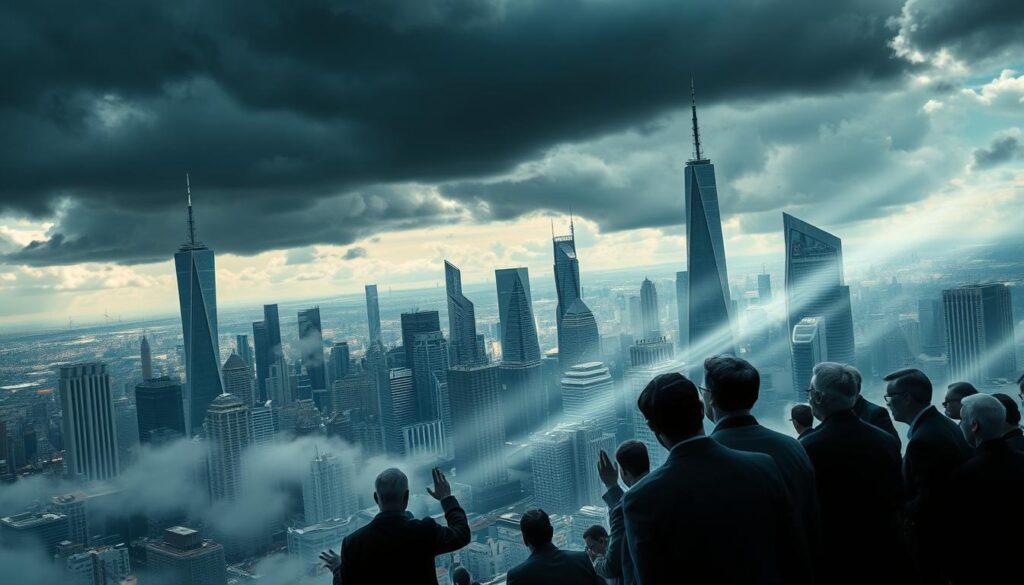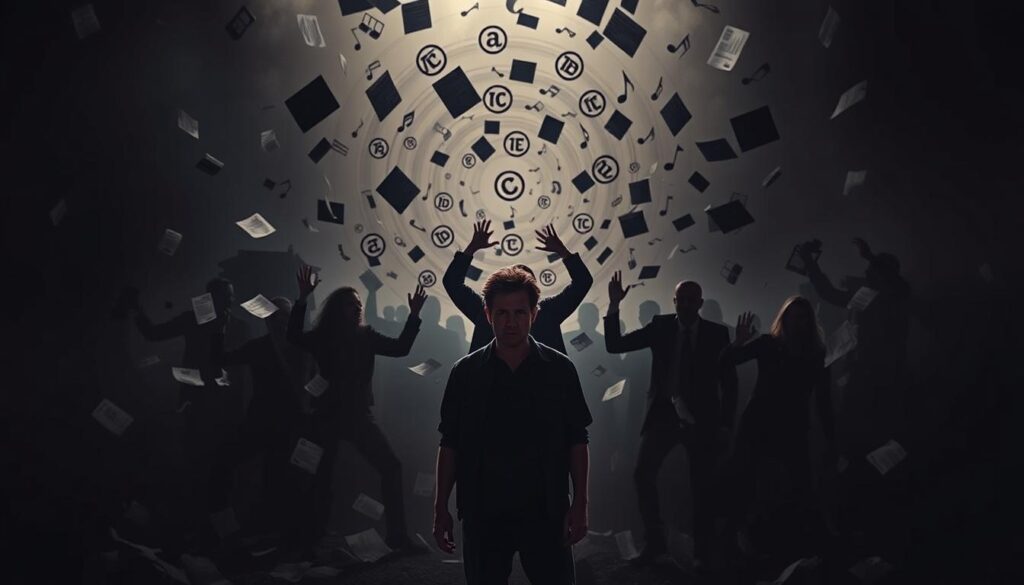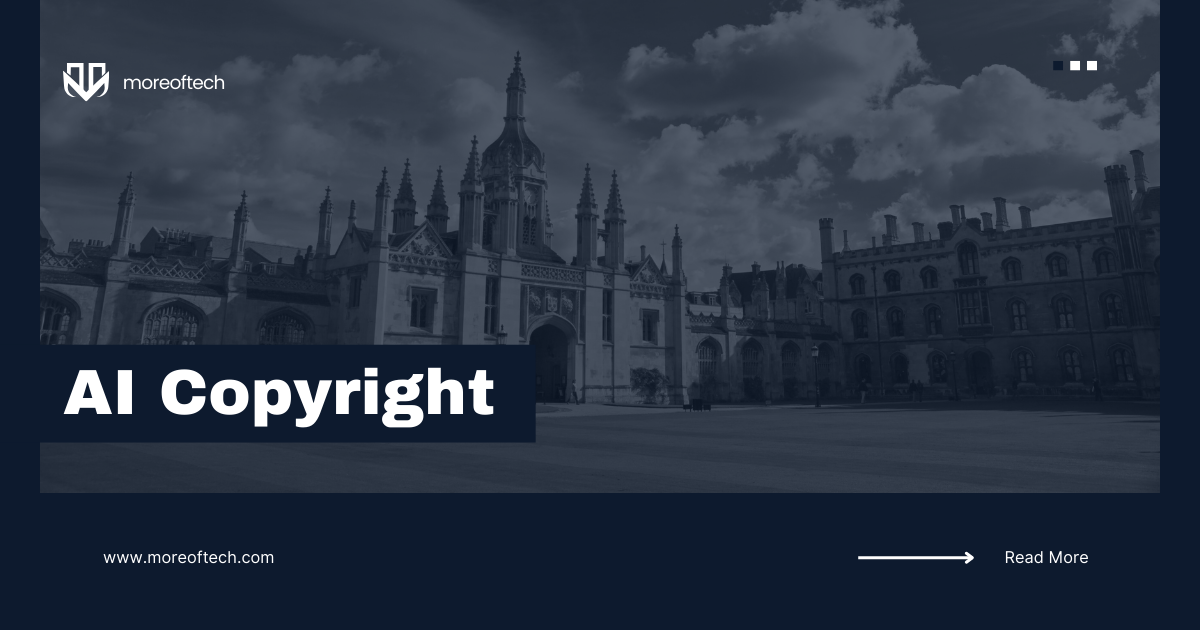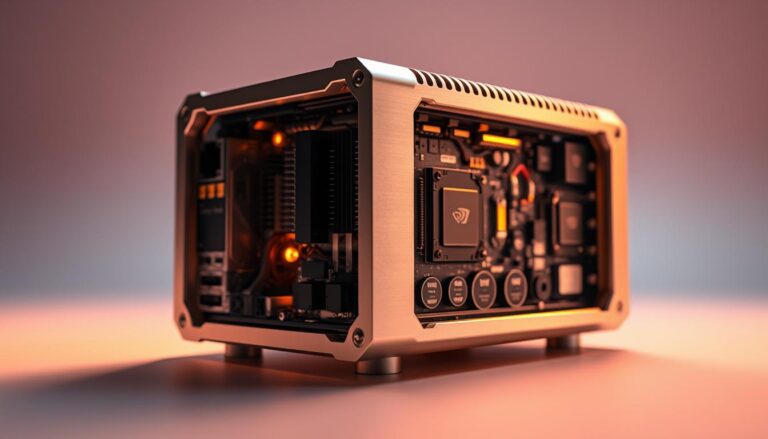AI Copyright: Oxford Experts Warn Changes Could Harm Creative Industries
Oxford University experts are warning about changes in AI copyright laws. These changes could hurt the creative industries a lot. The UK’s creative sectors add £126 billion to the economy and are at risk.
It’s important to understand AI copyright and artificial intelligence intellectual property. Tech companies want to use copyrighted works without asking, which could upset the creative world.
The Oxford Consultation on Copyright and AI has gotten thousands of responses. People are worried about the legal changes. These changes could change how creators protect their work.
Now, generative AI businesses must say if they use copyrighted materials. This makes things tough for creative people. The government is thinking about new rules, but it might take 18 to 24 months.
Artificial intelligence intellectual property rights are at a turning point. Your help is needed to protect the future of AI copyright for creative industries.
Table of Contents
Understanding the Oxford Consultation on Copyright and AI Initiative
The Oxford Consultation on Copyright and AI Initiative is a major step forward. It tackles the complex issues at the crossroads of machine learning and copyright. Experts from all over are coming together to tackle the big challenges in AI and creative tech.
This group is diving deep into the world of AI and intellectual property. They’ve gotten a lot of attention for their work. They collected over 10,000 comments from people in 50 states and 67 countries. This shows how important their work is worldwide.
Expert Contributors and Research Team
The team is filled with top experts in AI and copyright law:
- AI expert Professor Sir Nigel Shadbolt
- Neural network researcher Phil Torr
- Professor Lord Tarassenko, pioneer in neural network technologies
- Chris Morrison, copyright specialist from Bodleian Libraries
Core Research Objectives
The team’s main goals are to understand how machine learning and copyright interact. They want to:
- Look at how AI development might clash with intellectual property rights
- Make sure creative sectors are protected
- Encourage AI innovation that’s responsible
Key Consultation Findings
Their early findings show some big insights. They point out how AI might limit creative freedom. They think we might need to change our laws to fit new AI tech.
| Research Focus | Key Considerations |
|---|---|
| Legal Frameworks | Analyzing existing copyright laws |
| Creative Impact | Assessing AI’s influence on artistic innovation |
| Technological Boundaries | Exploring machine learning copyright limitations |
Current AI Copyright Laws and Proposed Changes
The world of AI copyright is changing fast. It’s causing big problems for creators and tech companies. The United States Copyright Office says AI works can’t get copyright protection unless a human made them.
- Works made only by AI can’t get copyright
- Only human creativity can lead to copyright
- People must say if AI helped make something they want to copyright
Recent court cases show how tricky AI copyright can be. Big fights are happening because of the push between new tech and old laws:
| Company/Plaintiff | Defendant | Copyright Issue |
|---|---|---|
| Getty Images | Stability AI | Unauthorized image processing |
| New York Times | OpenAI/Microsoft | Training AI on copyrighted articles |
| Music Publishers | Anthropic | Unauthorized use of song lyrics |
The laws are still being shaped, with courts saying AI creativity alone isn’t enough for copyright. Expect more updates as tech and laws keep moving forward.
Impact on Creative Industries’ Economic Foundation
Changes in AI copyright rules are causing big waves in the creative world. They threaten the economic balance of making content. It’s important to understand how AI ownership and patent rules affect this.
The creative field is at a turning point. AI is changing how we make, share, and earn from creative works.
Financial Implications for Content Creators
Content creators are facing big financial hurdles with the new AI copyright rules:
- Potential drop in what creators earn
- More competition from AI-made content
- Less value for original creative works
- Unclear income due to AI patent rules
“AI could change how we make creative work, making it cheaper but also making it harder for creators to earn from their work.”
Potential Job Market Effects
The job market for creatives is under a lot of pressure. AI systems with advanced learning can make products that might replace human creators.
Revenue Stream Disruption
The economic base of the creative sector is facing big challenges. The U.S. Copyright Office report shows big companies with lots of data might get a big edge. This could change how markets compete.
- High costs for individual licensing
- Bias towards public domain works
- More legal issues with AI ownership
The creative industries need to quickly adjust to these tech changes. They must stay strong in an AI world.
Big Tech’s Role in AI Copyright Debates

The world of AI model licensing is getting more complicated. Big tech companies are trying to figure out how to handle machine learning model IP. There’s a big gap between what they want and what the creative industry needs.
OpenAI told the UK Parliament something important. They said making top AI models needs a lot of copyrighted stuff. This has started a big debate about AI’s ethics and how it uses content.
- Over 10,000 comments were submitted to the U.S. Copyright Office regarding AI and copyright
- Approximately 50% of comments addressed the copyrightability of AI-generated works
- Major tech companies are seeking innovative approaches to AI model licensing
An Oxford research group says current plans might help big tech too much. They think it could hurt smaller, responsible AI companies. They say we need better rules that protect both new tech and ideas.
The principle of human creativity remains fundamental in copyright considerations, even as AI technology advances rapidly.
New trends show a growing market for AI training data. HarperCollins is making deals, like Microsoft paying $5,000 per title for AI rights. This shows a big change in how we see and value machine learning model IP.
It’s important to understand these complex issues. The tech world is changing how we see creative content and AI.
Legal Challenges and International Law Compliance
The world of AI copyright is changing fast, bringing new legal issues across borders. As rules for machine learning copyright grow, countries face big tech challenges.
The legal rules for AI copyright are changing worldwide. In November 2021, 193 UNESCO Member States agreed on AI ethics. This is a big step toward global agreement.
Navigating International Legal Complexities
Understanding AI copyright involves many legal areas. The Council of Europe’s Framework Convention on Artificial Intelligence is a key global agreement. It has 36 articles on human dignity and AI accountability.
- 36 articles addressing human dignity and technological accountability
- Comprehensive approach to AI rights and regulations
- Emphasis on transparency in AI development
Potential International Conflicts
Emerging economies struggle with AI copyright laws. The gap in rules between rich and poor countries makes it hard to protect machine learning copyright.
| Regulatory Challenge | Global Impact |
|---|---|
| Tech Corporation Influence | Complicates global governance |
| Enforcement Capabilities | Varies dramatically between nations |
| AI System Lifecycle | Deeply intertwined with corporate interests |
The legal world for AI copyright is still growing. Everyone wants rules that help creative work and tech progress.
Music Industry’s Battle Against AI-Generated Content

The music world is facing a big challenge with AI-generated content. Big record labels are taking steps to protect artists’ rights. This is in the era of neural network and deep learning copyright.
Sony Music has made a big move. They removed over 75,000 AI-generated tracks that used famous artists’ names. This shows the struggle between new tech and protecting art.
- Stars like Billie Eilish, Nicki Minaj, and Stevie Wonder are worried about AI music.
- The Recording Industry Association of America (RIAA) is fighting AI music platforms in court.
- Big labels like Sony, Universal, and Warner are suing AI tech companies.
AI music is a big deal. It has been seen over 1.7 billion times on YouTube in 2023. This is hurting artists’ money. The song “Heart on My Sleeve” got 9 million plays fast, showing how AI can change music.
“We’re fighting to protect human creativity from unauthorized AI reproduction,” says Mitch Glazier, RIAA CEO.
The music world is not giving up. The Human Artistry Campaign has seven rules for AI tech. These rules make sure human artists stay key in making music.
As deep learning copyright gets more complex, artists and tech companies need to find a way. They must respect artists’ rights while using new tech.
Creative Sector’s Response to Government Proposals
The creative industries are fighting hard against new rules on artificial intelligence and copyright. Artists, musicians, and leaders are using strong campaigns to safeguard their rights. They aim to protect their work in the new world of natural language processing copyright.
Top UK artists are standing up against the government’s AI copyright plans. They have started several key actions:
- A letter signed by famous musicians like Elton John and Dua Lipa against the changes
- Releasing a silent album called “Is This What We Want?” by 1,000 musicians
- The ‘Make it Fair’ effort to raise awareness on various media
Artist Protests and Campaigns
The creative community is showing strong unity against AI copyright changes. They worry about losing control over their work and facing unauthorized use.
“This is a critical moment for our creative industries,” says a representative from the Society of Authors, which received 1,035 member responses regarding generative AI.
Industry Leaders’ Statements
Important figures in the industry are speaking out against the proposed changes. They stress the dangers to creative workers. They call for clear rules that keep artistic integrity safe.
| Organization | Key Concern | Action Taken |
|---|---|---|
| Society of Authors | AI usage transparency | 46-page consultation submission |
| European Writers’ Council | Preventing unfair AI advantages | Warning against copyright exceptions |
| Publishers Association | Ethical AI implementation | Advocating for regulatory oversight |
The deadline for the consultation on February 25, 2025, is a key moment. It’s a time for creative industries to deal with the mix of artificial intelligence and copyright rights.
Alternative Solutions and Recommendations
The world of AI patent protection and algorithm ownership needs new ideas. These ideas must balance tech progress with creative rights. New solutions are coming to help content creators and AI companies.
Here are some key ways to tackle AI copyright issues:
- Use clear licensing models for AI training data
- Set up systems where users can choose to share content
- Make fair payment plans for content use
- Make sure everyone knows who owns AI algorithms
Big tech companies are working hard to make AI better. For example, OpenAI and Google are working on licensing deals. Shutterstock has made $104 million from these deals, showing how everyone can win.
| Company | Licensing Revenue | Approach |
|---|---|---|
| Shutterstock | $104 million | Direct content licensing |
| $70 million | Data usage agreements | |
| Pending | Negotiating content rights |
The US Patent and Trademark Office is listening to feedback to update AI rules. This shows a big change is coming to protect tech and creative rights.
Balancing innovation with creator protection remains the ultimate goal of these evolving strategies.
As AI changes creative fields, we need to work together. We must respect both tech’s power and art’s value for growth.
Economic Value of UK’s Cultural Assets
The UK’s creative industries are a key driver of economic growth. They add £124.6 billion to the economy each year. This makes them a vital sector that keeps growing and changing.
Current Market Dynamics
Understanding the creative sector’s economic power is key. It makes up 5.7% of the UK’s total economic output. This is more than many traditional sectors.
- The video games industry leads in Europe
- Technology services make up over 40% of creative industry jobs
- AI model licensing is becoming more important
Future Growth Potential
The mix of creativity and technology opens up huge opportunities. AI is expected to bring in £14 billion in revenue and create over 64,500 jobs by 2024. Machine learning model IP is crucial for future growth.
The creative industries are not just cultural expressions, but powerful economic engines driving innovation and global competitiveness.
AI could add £550 billion to the UK GDP by 2035. The technology sector is now worth £1 trillion. This shows how important AI model licensing and intellectual property management are.
Strategic Considerations
Creative professionals need to be careful in this changing world. A huge 83% of creatives are already using machine learning tools. This shows how fast the sector is adopting technology.
Conclusion
The debate on AI copyright is complex, where tech meets creativity. The U.S. Copyright Office has looked at over 10,000 comments. This shows how important machine learning copyright is in our digital world.
AI content raises big questions about copyright. The Copyright Office says human creativity is key to copyright law. AI can make amazing things, but only if humans add a lot to it can it be protected.
As AI copyright evolves, we need a balanced approach. The Copyright Office suggests looking at each case to decide on authorship. This means humans’ choices and changes are very important.
Creative people must learn to work with these new rules. This will help protect their work in a world where AI is more common.
The story of AI copyright is far from over. There will be more reports to tackle the legal issues. Your understanding and input are key to creating a fair system that values both tech and human creativity.


